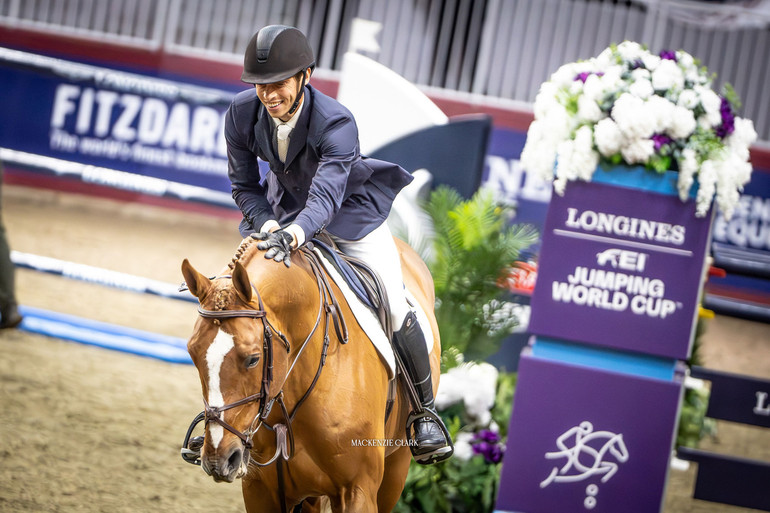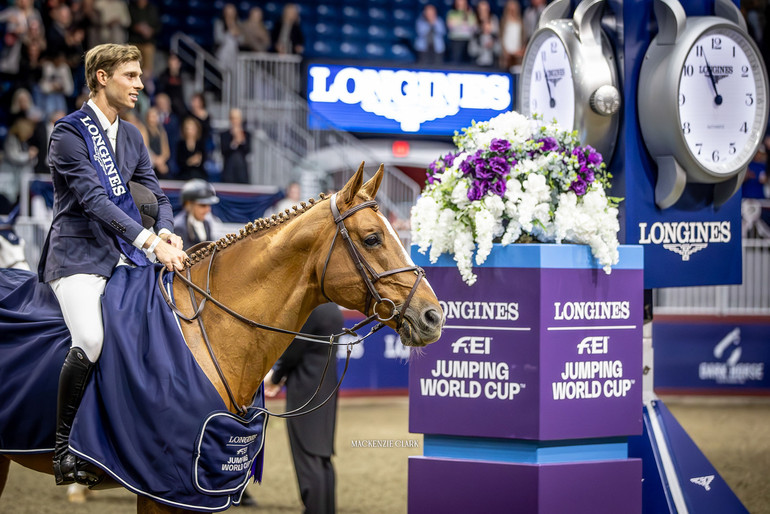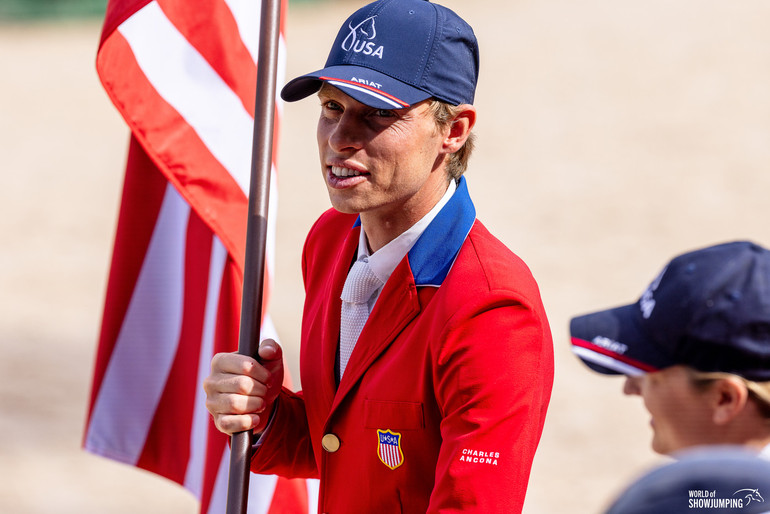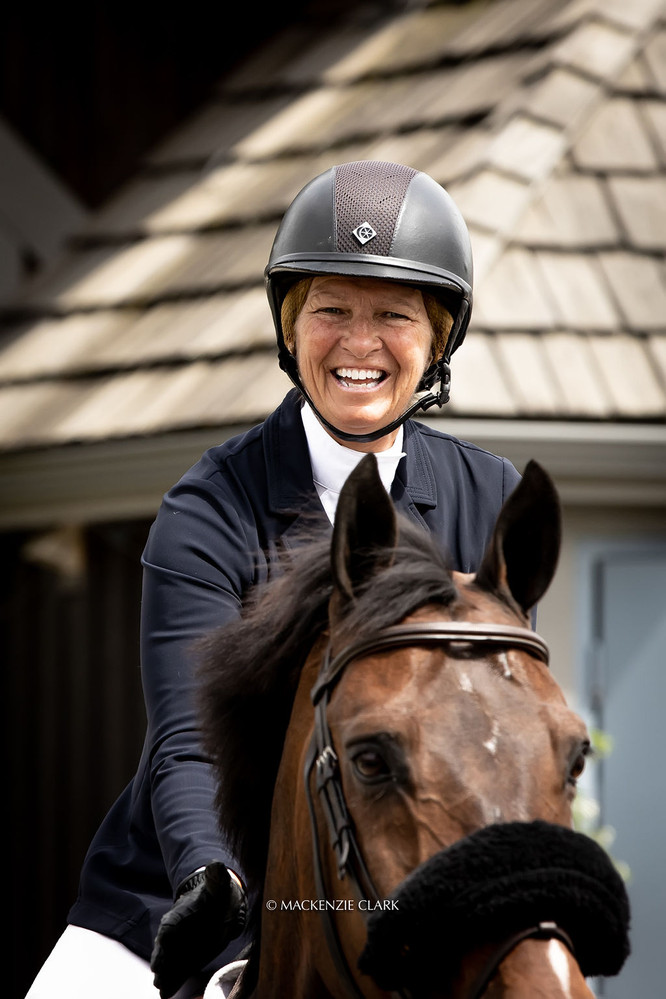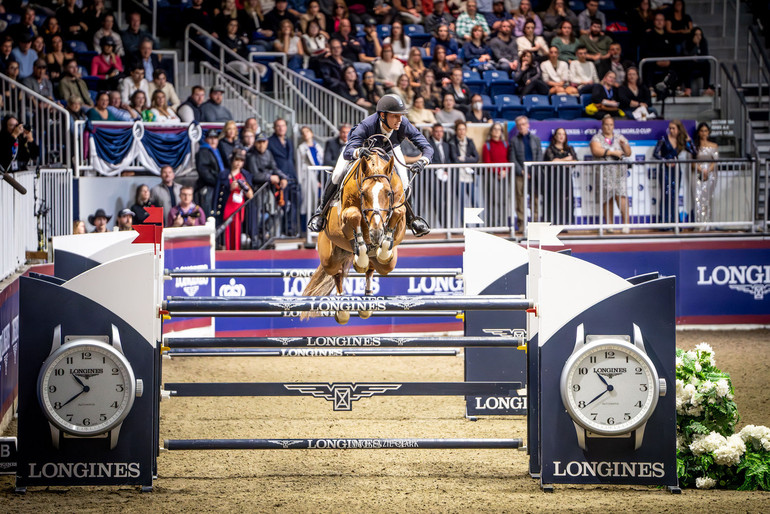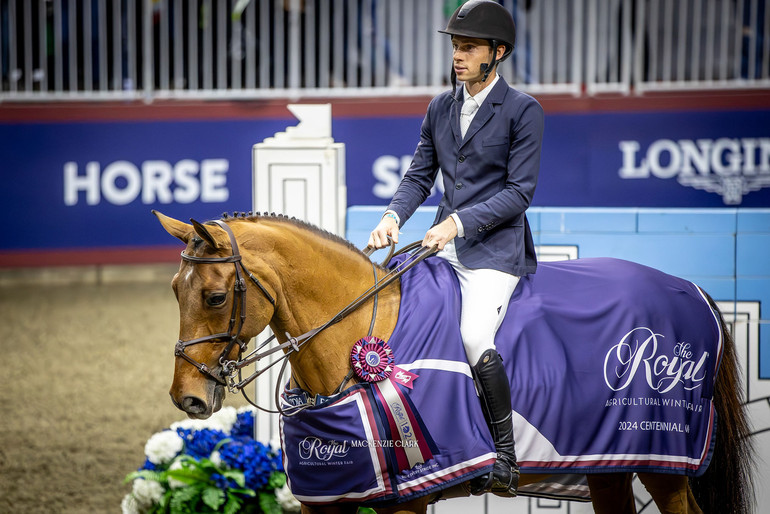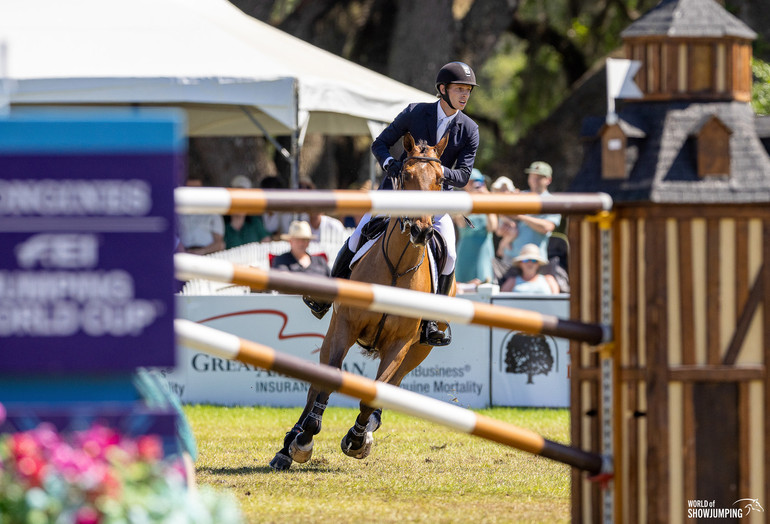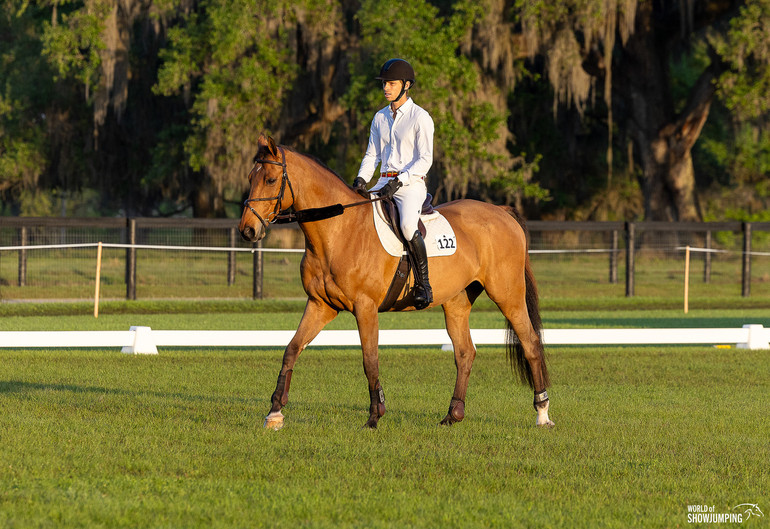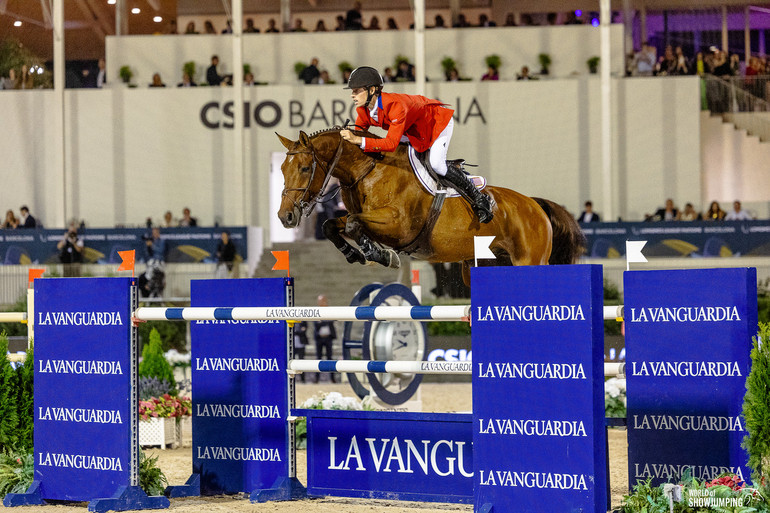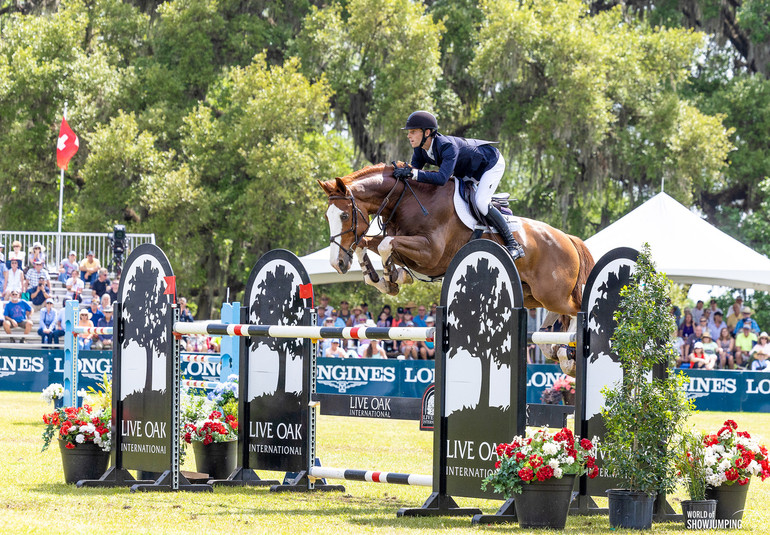Text © World of Showjumping
Alex Matz’s week at The Royal Horse Show in Toronto was one to remember, but the success has certainly not gone to the 28-year-old’s head. Less than a week after riding Ikigai to victory in the Longines FEI Jumping World Cup at the historical Canadian venue, as well as winning two five-star speed classes with Cashew CR, Alex is back at home in Pennsylvania – with his feet firmly on the ground.
“There are a lot of riders that have won one five-star Grand Prix,” he says. “What ultimately separates the really great riders from the good riders is that they can do it consistently. Now, I have to work even harder and maximize every opportunity that comes my way.”
Compounding improvement
This kind of mindset will turn out to be a red thread in our conversation with the up-and-coming American rider, a son of Michael Matz and Dorothy Alexander Matz.
“I believe in the power of compounding effort and improvement,” Alex says. “I have tried to really focus on that; if I can get a quarter of a percent better every day or every week, and just work as hard as I can, then hopefully when the next opportunity comes – whether that is a new horse, a show, or a sponsor – I will be prepared to take advantage and not let anyone down.”
I believe in the power of compounding effort and improvement
“At times, it’s hard to have this mindset, because in this sport you have a lot of disappointing days, most days are probably average in fact, and you will feel like you are not getting anywhere, but you just have to know that the great days are good enough for you personally,” he says.
“I also think you have to just enjoy the horses on a daily basis,” Alex continues. “I mean, if you don't enjoy the horses then you shouldn't be doing this – that's just a fact. If you're not in it because you like horses, then you should probably pick something else."
In the right hands
Alex grew up with two parents that are both accomplished equestrians. During the 1970s, 80s and 90s, his dad Michael Matz won numerous individual and team medals at the Olympic Games, World Championships and Pan-Am Games, as well as taking the title at the 1981 World Cup Final. The six-time U.S. national champion then made a career-switch towards the end of the 90s, moving on to become a successful trainer of racehorses. Like her husband, Dorothy Matz was also a member of the U.S. jumping squad and was a team bronze medalist at the Pan-Ams in 1991.
However, neither of them pushed their children to ride. First and foremost, Dorothy Matz put an emphasis on education, more so than on equestrian sport. “I grew up with my siblings on the same farm where I now run my business – Vintage Farm Sales – in Coatesville, Pennsylvania. My mom always kept one or two horses for us, but she thought school was really important – you never know what can happen and she wanted us to have a backup plan,” Alex tells. “I first went to school in Pennsylvania, and then later to boarding school in Virginia. I would ride during the summer, while in the winter season I would try to take the weekends to ride in Florida, but in spring and fall I would only ride once or twice a month. When I went to college in Tennessee, I would also ride around my school schedule.”
I had nothing to lose by trying
“When I graduated at 22, all my friends were getting jobs in the corporate world. I always liked the horses though and I thought, well, if there's an opportunity to have a career with them, I better give it my all right now. I had nothing to lose by trying,” Alex tells.
“John Madden put me in touch with Jos Lansink, who let me come over to his stable in Belgium and work for about four months – not so long, but I learned a lot,” Alex tells. “It was the first time that I got to ride a lot of horses, mainly the young ones as at the time Jos had Frank Schuttert and Pieter Clemens riding for him. Jos would be in the ring helping me jump every Tuesday and Thursday, and I got a lot of time in the saddle which was incredible. I really enjoyed it, but in the end I thought that there wasn't so much opportunity for me to advance as Jos had several good riders who had been with him a long time already. So, I went back to the U.S. where I got a job with Beezie and John Madden.”
No one better than Beezie
“There is no one better to learn from than Beezie,” Alex says. “It was very different from working at Jos’ yard, which is a big dealing stable with at least 60 something horses and several riders; but learning their boutique system was incredibly valuable. At Beezie and John’s there were maybe 14-15 horses in the barn, and maybe six were for Beezie – it was smaller in comparison but very detail-oriented. At JMS they would have a long-term schedule which had all their up-coming shows listed, in addition to weekly and daily schedules with individual planning for each horse. John does a fantastic job of organizing all the logistics and training; it all ran like a clockwork.”
“Beezie would be on each and every horse for 45 minutes to an hour with proper walk at the beginning and end of each flatwork session. Just watching Beezie ride every day was phenomenal. Being in their system was fantastic for me,” Alex tells.
There is no one better to learn from than Beezie
“After nine months with Beezie and John, I decided it was time to start up on my own, so I returned home. I didn’t have much to lose, and I have very good advisors in my parents so I wanted to see what I could do,” Alex tells. “At the time, I had Cashew, but he had been injured and was just coming back, and then I bought a 6-year-old together with my mom at the VDL auction, so it was pretty much starting from scratch.”
“In our area we have a lot of good eventers so what I would do is go to all their different barns. I went to Boyd Martin and Jennie Brannigan and jumped horses for them, especially during Covid when not so much was going on. Then I actually got a couple of eventers to sell, nothing particularly fancy, more like 1.20-1.30m horses and I would be happy if I got a clear round,” he laughs. “I took whatever I could get, and I’m grateful to the people that gave me these horses to ride.”
“In the fall of 2020, the McNeil-family reached out to my mom. They were looking for somebody to help ride some younger horses for them and that was a big opportunity for me,” Alex tells about his next step.
Putting it all together
“I currently have five horses for myself, so it’s still a pretty small team,” Alex explains. “Then we also have a few clients, and this year my brother has started to help me – giving me a hand in trying to expand the business.”
“Ikigai came to me from Jos Lansink; the McNeils bought him for me as an 8-year-old,” Alex tells about his World Cup-winner. “At the time, he was a little behind because of Covid, but the feeling that I had when I tried him was like nothing else – he has so much talent. Unfortunately, as he was turning ten, he ended up getting hurt and was out for about one year. That was obviously a setback; he had just jumped his first five-star Grand Prix at the end of his 9-year-old year, but luckily I have a good team, patient owners and he is a resilient horse. There were a lot of times that I doubted whether we were moving forward but he's come back really well. I think we're finally starting to be a team rather than me just sort of riding his talent.”
“Cashew was actually meant to be a U25 horse for me. Mario Deslauriers found him for us when he was eight, back when I was still in college. Obviously, he has exceeded all of our expectations!” Alex tells about the 16-year-old gelding that recently won both the 1.45m Strength & Speed Competition and the 1.50m Centennial Cup in Toronto – bringing the pair’s international victories to a total of five this year.
I knew it was just a matter of me needing to put it all together
“Cashew is a really sweet horse who loves people. When you go in the barn, he is happy to see you. He always wants to be around people, and he always wants to please. At the same time, he's such a competitor and fighter. He is maybe not the scopiest horse, but he's for sure one of the smartest, one of the bravest and the fastest horse I've ever had. He’s been an amazing horse for me, and by now we just know each other so well.”
“I didn’t expect to have the week that I did, but I knew we were capable,” Alex reflects on his performances at The Royal Horse Show. “The week before Toronto, I had actually really let Cashew down and I got some wise words from my mom, my dad and Kent Farrington. So, I thought to myself, I can't let my horse down again and with Cashew I do feel like he can win any class he’s entered in.”
“Then Ikigai has just been getting better and better. In Spruce, we were just starting to jump big classes again, then I made a small mistake in the jump-off of the Hampton Classic, and a costly rider error in the Longines League of Nations Final in Barcelona cost us a clear round, so I knew it was just a matter of me needing to put it all together,” Alex tells about his thoughts coming into the week in Toronto.
Level-headed
“The important thing I have come to understand is that it’s not about the mistakes that you make, but about how you come back from them,” Alex says. "That’s what separates the great riders from the good. Coming into The Royal, I knew it was on me to not make the same mistakes again because both Cashew and Ikigai were more than capable.”
“What Ikigai and I don’t have yet is that much experience in the big jump-offs. I had made a mistake in the jump-off of the Hampton Classic Grand Prix, so I took that as a learning experience to improve. I gave it a chance in Toronto, and luckily he was right there with me. I hope now, as we really start to form a partnership, there can be more opportunities for us to do classes like that,” Alex says.
You can be grateful and enjoy the good moments, but you have to look to how you can improve too
"I’m obviously super honored to be among all those good riders,” Alex says about competing alongside the best in the world, even leaving McLain Ward below him on a World Cup podium. “It makes me really stop and think that I'm grateful for the team I have, for the horses I have and I'm extremely excited for the future.”
“I hope there's a lot in front of me, but, I mean, look at the top ten in the world and you know they win several five-star Grand Prix classes every year. If that’s where you want to be, you can be grateful and enjoy the good moments, but you have to look to how you can improve too.”
No pushy parents
With Alex based out of his parents’ farm, both his mom and his dad are closely involved in his daily work. “My dad still has a small stable of racehorses and every morning he’s at the track, but I’d say he is there 95% of the time I school a horse,” Alex tells. “He's very involved in that way, and I also seek a lot of advice from my mom. They are not at every show with me to help, but at a decent amount of them. It’s also been great to have my brother Robert involved, especially as I have been traveling a good amount and he’s been keeping my horses in the best shape possible when I have been away. It's good to have somebody you can always count on.”
“It’s a family operation still, but I must say my parents give me a lot of freedom too,” Alex tells. “It's really just me asking my parents for advice and they never force anything on me. If I didn't ask for help, then they wouldn't just show up. I think it’s very nice to be supported but not pushed to do anything.”
A lot of times my dad would preach the values of simplicity and tell me to ‘just put a snaffle and ride better’
“Both my parents believe that if you're a better rider, you will always have an upper hand and that's a skill that no one can take away from you. Hard work towards becoming a better rider and horseman will always give you an advantage and provide opportunities,” Alex says.
“I can't tell you how many times I have told my dad that I think we need to change the bit or the boots, or you know, try this little exercise. And of course, you always have to try to improve and adapt to modern standards but a lot of times my dad would preach the values of simplicity and tell me to ‘just put a snaffle and ride better’. And most of the time that works,” Alex laughs. “I think that's a huge take-away from my dad, but it also has to be counterbalanced of course because the sport has changed a lot.”
“I think what really has changed from my dad’s time at the top is that it’s become much harder to find people who will give you horses to ride – especially in the US with how expensive it has become. Previously, there were more owners, and also more people catch-riding, and now there is not really such a thing anymore. I'm fortunate to have some support, but you have to create your own opportunities. Because without a good horse, it doesn't really matter how good you ride,” Alex says.
Keeping it classic
The Matz’s approach to the horses is according to Alex pretty basic and about making it as simple and stress-free as possible. “The most important thing is that the horses are happy and healthy and understand what you want them to do,” he says. “I think the simpler you can keep things for them, ultimately the better.”
“The way we work our horses is a lot of classical flatwork with its origins in dressage. The most important is that the horses understand what you are asking, but you also need them to work enough on the flat so that when they go into the ring, they are fit and prepared,” Alex points out. “So, it's simple, but it's precise and it's very important that they are working to build those muscles so that they don't go in the ring and find it challenging.”
We do go to a lot of shows nowadays and it's easy for the horses to get sick of it, so they also need to be horses
“We vary our work a lot though, and I think that’s really important to keep the horses interested. We have a beautiful farm, and we ride on the grass whenever we can – most days I'd say. And we have a big hill where we do a lot of hill work with them which they really enjoy. We do go to a lot of shows nowadays and it's easy for the horses to get sick of it, so they also need to be horses – work outside in nature and go in the paddock,” Alex says.
To have a dad like Michael Matz and a mom like Dorothy Matz clearly is an advantage when working professionally with horses. “I think it adds an extra level of knowledge,” Alex says. “My dad has been around horses 55 plus years so there is not much that he hasn't seen. He has a pretty good idea of what's going on, which is a huge asset.”
The experience his dad has gained from working with racehorses is also something Alex has tried to learn from. “The training is pretty different, but there are definitely some parallels and there are protocols that can be useful. What’s interesting is that you have access to more people who maybe can provide different ideas for you,” he says. “In our sport we are dealing with a living being and an athlete, so there are going to be setbacks. And being more knowledgeable about how to handle those setbacks and move forwards will always give you an edge.”
Good horsemanship is wanting to constantly learn
Working with some of the best in the sport, Alex also has his thoughts on good horsemanship. “I think good horsemanship is wanting to constantly learn about the horses and how you can better communicate with them, as well as making sure that the horses are happy and healthy,” he says. “I think curiosity about the horses is key.”
I think good horsemanship is wanting to constantly learn about the horses
“I also think that we have to understand that horses are wild animals and letting them have that space is so important,” Alex points out. “Like, right now, I'm looking at my horses out in the field and they couldn't be happier. When my horses got back from Toronto, I'm sure that they were happy they had done well, but I think they were much happier about being in the field again – because they are horses! With all the shows and the travelling nowadays, we have to constantly be aware of what we are putting the horses through. It’s not just that because there are more five-stars we have to show more.”
“There are a lot of good horsemen and horsewomen out there, and the amazing part of our sport is that we have access to those people – incredible riders and trainers. Honestly, I have never asked a top rider or horse person a question and not received a proper answer. And its free - it's just that people have to want to learn and be interested. So, I don't think you can blame a lack of horsemanship on anything other than people not being interested in it,” Alex says.
The need for owners to support true professionals
As to the future of the sport, Alex is optimistic, but he also sees challenges. “There are a lot of great shows and I think that in some ways the sport is gaining popularity,” he says. “Overall, there is probably more money in the sport, which is good for business. At the same time, I think that kind of money makes it really quite hard for people that don't have a billion in the bank to compete. Without owners that want to support true professionals, I think it's really hard for any young person to catch a break.”
Without owners that want to support true professionals, I think it's really hard for any young person to catch a break
“The top ten riders in the world are always showing, and you get better by always showing at a high level. However, to do that you need a team of horses, which again requires that you need a lot of people to take a chance on you. And that’s not that easy when you are young and trying to build up among many established names,” Alex points out.
“I have had a lot of moments of doubt and a lot of moments where I was not sure if I was moving forward in the right direction,” Alex says. “But you have to stay optimistic and normally opportunities do come to those that make them.”
Specific goals will easily let you down
With his breakthrough in Toronto, Alex is more motivated than ever to become even better. “I’m excited for the future and I really hope that this will bring more opportunities, but I don’t go around with immediate big goals,” Alex says after his World Cup-win.
More important than goals is working hard and putting yourself in positions where you can achieve those goals
“I'd like to just build my team and have a better year than this year, so if I keep getting better and better every year then that'll be good,” he smiles. “Then one year we'll have a really good year” he laughs. “Of course, I dream about being competitive in Aachen and Geneva and at the Olympics, but I think more important than goals is working hard and putting yourself in positions where you can achieve those goals."
“Also, sometimes things happen in ways that you don't expect. And I do believe that everything happens for a reason, and a lot of it you can't predict. You just have to maximize what you can with good habits and systems, and when you get an opportunity, seize it!”
20.11.2024 No reproduction of any of the content in this article will be accepted without a written permission, all rights reserved © World of Showjumping.com. If copyright violations occur, a penalty fee will apply.



